八年级英语下册Unit 6 An old man tried to move the mountains Section A(3a-3c)(共35张PPT)
文档属性
| 名称 | 八年级英语下册Unit 6 An old man tried to move the mountains Section A(3a-3c)(共35张PPT) | 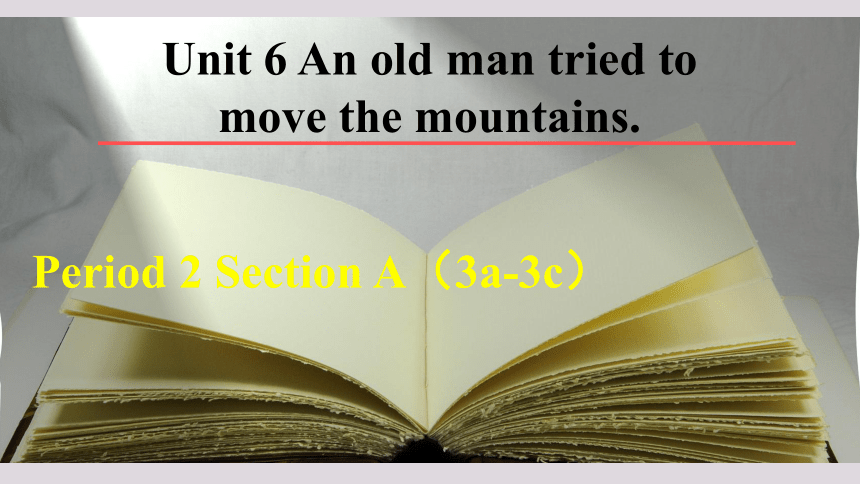 | |
| 格式 | pptx | ||
| 文件大小 | 14.9MB | ||
| 资源类型 | 教案 | ||
| 版本资源 | 人教新目标(Go for it)版 | ||
| 科目 | 英语 | ||
| 更新时间 | 2025-02-08 16:13:40 | ||
图片预览

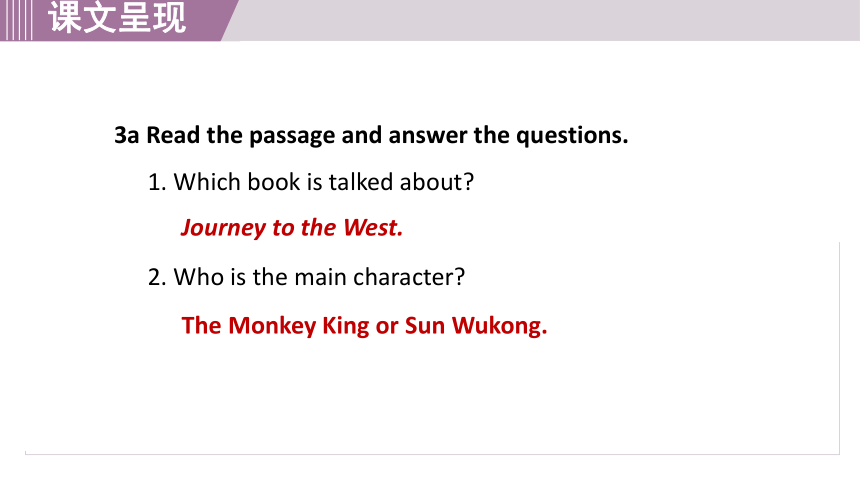

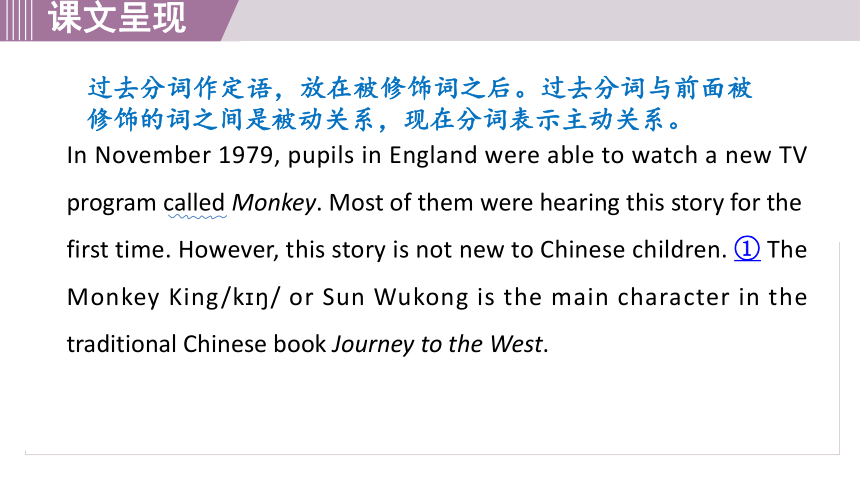
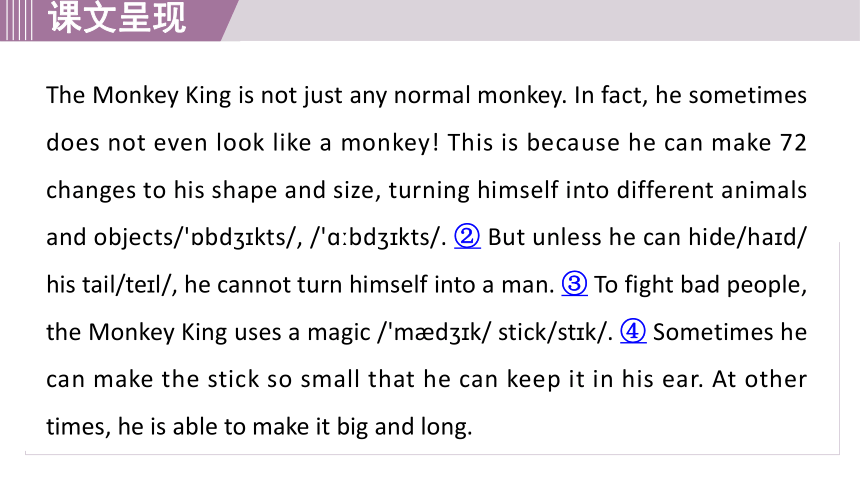
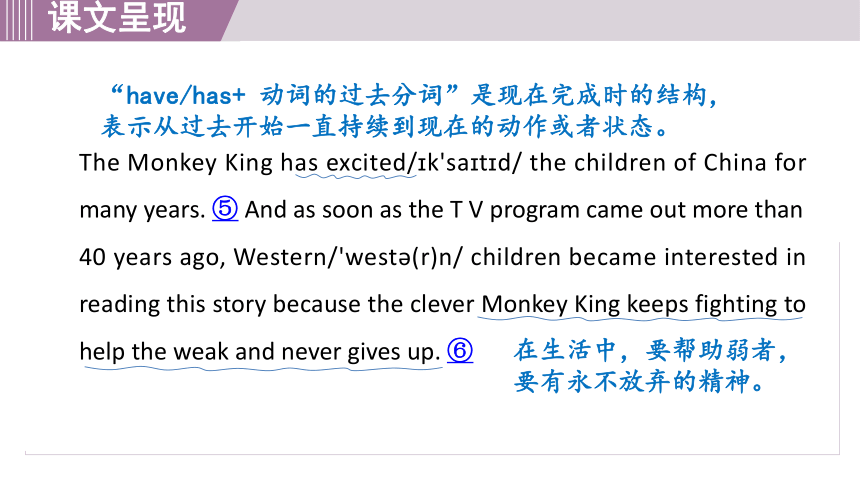
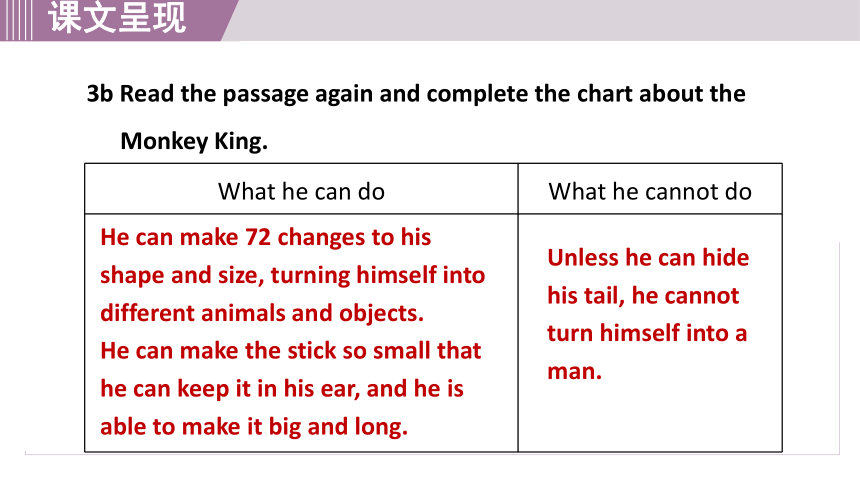
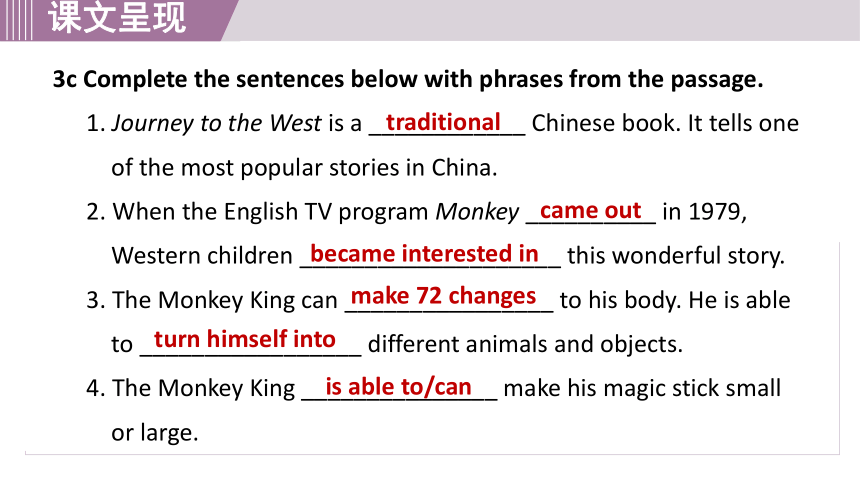
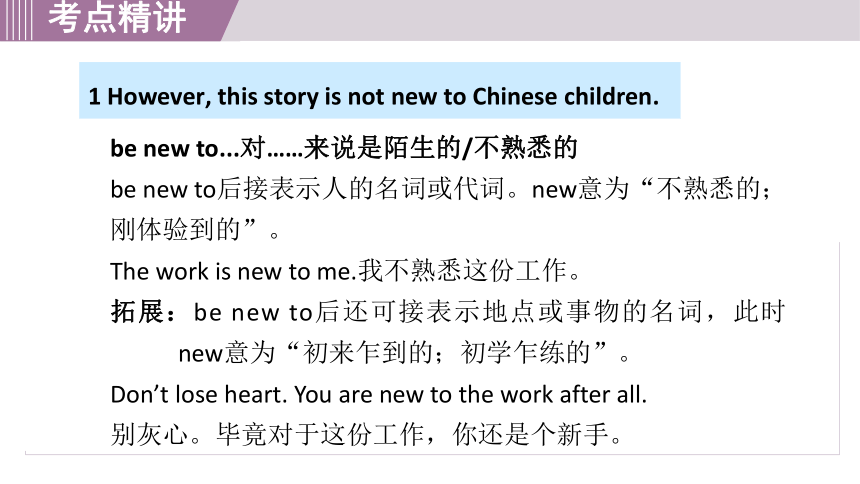
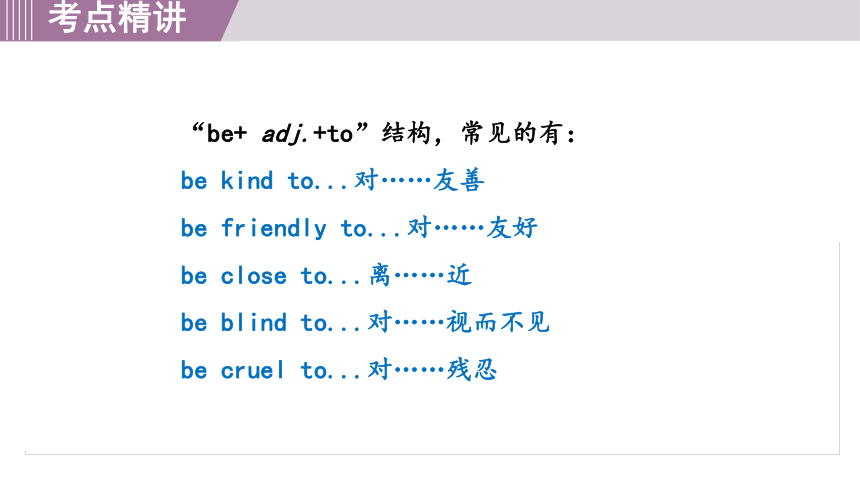
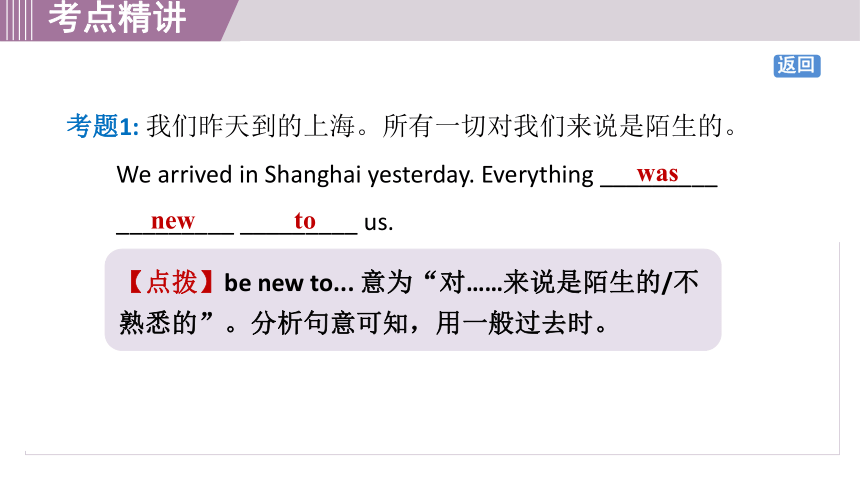
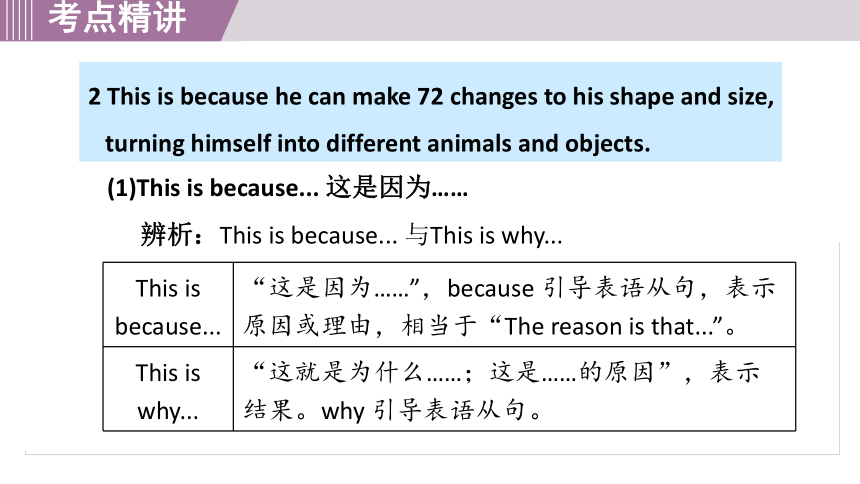
文档简介
(共35张PPT)
Period 2 Section A(3a-3c)
Unit 6 An old man tried to
move the mountains.
3a Read the passage and answer the questions.
1. Which book is talked about
2. Who is the main character
Journey to the West.
The Monkey King or Sun Wukong.
3. What is he like
He can change his shape and size, but he cannot turn himself into a man unless he can hide his tail. He is clever. He keeps fighting to help the weak and never gives up.
In November 1979, pupils in England were able to watch a new TV program called Monkey. Most of them were hearing this story for the first time. However, this story is not new to Chinese children. ① The Monkey King/k / or Sun Wukong is the main character in the traditional Chinese book Journey to the West.
过去分词作定语,放在被修饰词之后。过去分词与前面被修饰的词之间是被动关系,现在分词表示主动关系。
The Monkey King is not just any normal monkey. In fact, he sometimes does not even look like a monkey! This is because he can make 72 changes to his shape and size, turning himself into different animals and objects/' bd kts/, /'ɑ bd kts/. ② But unless he can hide/ha d/ his tail/te l/, he cannot turn himself into a man. ③ To fight bad people, the Monkey King uses a magic /'m d k/ stick/st k/. ④ Sometimes he can make the stick so small that he can keep it in his ear. At other times, he is able to make it big and long.
The Monkey King has excited/ k'sa t d/ the children of China for many years. ⑤ And as soon as the T V program came out more than 40 years ago, Western/'west (r)n/ children became interested in reading this story because the clever Monkey King keeps fighting to help the weak and never gives up. ⑥
“have/has+ 动词的过去分词”是现在完成时的结构,表示从过去开始一直持续到现在的动作或者状态。
在生活中,要帮助弱者,
要有永不放弃的精神。
3b Read the passage again and complete the chart about the Monkey King.
What he can do What he cannot do
He can make 72 changes to his shape and size, turning himself into different animals and objects.
He can make the stick so small that he can keep it in his ear, and he is able to make it big and long.
Unless he can hide his tail, he cannot turn himself into a man.
3c Complete the sentences below with phrases from the passage.
1. Journey to the West is a ____________ Chinese book. It tells one of the most popular stories in China.
2. When the English TV program Monkey __________ in 1979, Western children ____________________ this wonderful story.
3. The Monkey King can ________________ to his body. He is able to _________________ different animals and objects.
4. The Monkey King _______________ make his magic stick small or large.
traditional
came out
became interested in
make 72 changes
turn himself into
is able to/can
1 However, this story is not new to Chinese children.
be new to...对……来说是陌生的/不熟悉的
be new to后接表示人的名词或代词。new意为“不熟悉的;刚体验到的”。
The work is new to me.我不熟悉这份工作。
拓展:be new to后还可接表示地点或事物的名词,此时new意为“初来乍到的;初学乍练的”。
Don’t lose heart. You are new to the work after all.
别灰心。毕竟对于这份工作,你还是个新手。
“be+ adj.+to”结构,常见的有:
be kind to...对……友善
be friendly to...对……友好
be close to...离……近
be blind to...对……视而不见
be cruel to...对……残忍
考题1: 我们昨天到的上海。所有一切对我们来说是陌生的。
We arrived in Shanghai yesterday. Everything _________
_________ _________ us.
was
new to
返回
【点拨】be new to... 意为“对……来说是陌生的/不熟悉的”。分析句意可知,用一般过去时。
2 This is because he can make 72 changes to his shape and size, turning himself into different animals and objects.
(1)This is because... 这是因为……
辨析:This is because... 与This is why...
This is because... “这是因为……”,because 引导表语从句,表示
原因或理由,相当于“The reason is that...”。
This is why... “这就是为什么……;这是……的原因”,表示结果。why 引导表语从句。
Tom was late for school. This is because he stayed up late last night. 汤姆上学迟到了。这是因为昨天晚上他熬夜到很晚。
My mother is ill at home. This is why I left so early.
我妈妈生病在家。这就是我为什么早早离开了。
敲黑板
“This is because/why...”句型中的This 有时也可以替换为That。
考题2: 他没有参加聚会。这是因为这些天他很忙。
He didn’t go to the party. __________________ he is very busy these days.
This is because
(2) turn... into 变成
相当于change...into。指本质上的改变,还可指形式上、状态上的改变。
The caterpillar will turn into a butterfly.
毛毛虫将变成一只蝴蝶。
The sofa turns into a bed. 这个沙发变成了一张床。(形式上)
Water can turn into ice. 水可以变成冰。(状态上)
图解助记
与turn 相关的短语:
考题3: 两年前,我们把荒地变成了稻田。
Two years ago, we ________ the wasteland ________ rice fields.
turned into
返回
3 But unless he can hide his tail, he cannot turn himself into a man.
hide /ha d/ v. 隐藏;隐蔽
They may hide a coin in one of the dumplings.
他们可能会在其中一个饺子里藏一枚硬币。
She hid the money from her husband.
她把钱藏起来不让她丈夫看见。
拓展:hide 还可以作不及物动词,意为“躲避;隐匿”。
The boy hid behind the sofa. 这个男孩藏在了沙发后面。
hide 作及物动词时,其过去式、过去分词分别为hid, hidden。hide sb./sth. from sb.“把某人/某物藏起来不让某人看见”。
考题4: The little girl wants to h herself under the bed so that others can’t find her.
ide
返回
4 To fight bad people, the Monkey King uses a magic stick.
(1) magic /'m d k/ adj. 有魔力的;有神奇力量的
He is a magic character. 他是一个有魔力的人物。
拓展:(1)magic还可作名词,意为“魔术;魔法;魔力”。
Music has magic. Different kinds of music bring you
different feelings.
音乐有魔力。不同种类的音乐带给你不同的感受。
(2)其对应的名词为magician,意为“魔术师”。
语境助记
The magician is performing magic on the stage. He is waving a magic wand. Do you think he has magic 魔术师正在舞台上表演魔术。他正挥舞着魔杖。你觉得他有魔法吗?
考题5: He thinks the pen is a ___________(有魔力的) tool.
magic
(2) stick /st k/ n. 棍;条
Amy then found a strong, straight stick.
埃米后来找到一根又结实又直的棍子。
stick 为可数名词,常见短语有:
dry sticks 枯枝
a walking stick 拐棍
拓展:stick 还可以作动词,其用法如下:
将……刺入;刺
The nurse stuck the needle into my left arm.
护士把针扎进我的左胳膊。
粘贴
He stuck a stamp on the envelope. 他把一张邮票贴到信封上。
stick to (doing) sth. 坚持(做) 某事
You are on the way to success as long as you stick to your dreams. 只要你坚持你的梦想,你就在通往成功的路上。
stick
考题6: Look! Some __________( 枝条) are on the road. Let’s pick them up.
sticks
考题7: —Do you know the astronaut Wang Yaping
—Sure. She is a great woman who can _______ her dreams. I really look up to her.
A. pay for B. stick to C. lay out D. set out
B
返回
【点拨】用短语辨析法。pay for支付;stick to 坚持;lay out摆放;set out 出发。根据句意及“her dreams”可知是坚持梦想。
5 The Monkey King has excited the children of China for many years.
excite / k'sa t/ v. 使激动;使兴奋
The news excited everybody. 这消息使每个人都兴奋了起来。
拓展:excite 的词形变化:
excite
excited adj. 激动的;兴奋的(通常主语为人或形容人的感受)
→ be excited about 对……感到兴奋
exciting adj. 使人兴奋的;令人激动的(通常修饰事物)
excitement n. 激动;兴奋
为及物动词,后接表示
人的名词或代词。
语境助记
We are always excited about the exciting news. When we hear it, we often shout in excitement. 我们总是对令人激动的消息感到兴奋。当我们听到它时,我们常常兴奋地大声叫喊。
返回
6 And as soon as the TV program came out more than 40 years ago, Western children became interested in reading this story...
(1) (高频)come out 出版;发行;发表
When will her novel come out 她的小说什么时候出版?
敲黑板
come out 的主语常常是书籍、杂志或报刊等,不能用于被动语态。
拓展:come out 的其他用法:
(太阳、月亮、星星)出现
The stars are coming out. 星星出来了。
为人所知
The secret will finally come out.
这个秘密终究会被人知道。
come out
come 的其他短语:
come back 回来
come into 进入
come up 发生;被提及
come true 实现
come from 来自
come on 快点
考题8: 他的新书将于明年出版。
His new book will _________ _________ next year.
come out
(2) (重点)Western /'west (r)n/ adj. 西方国家的;(尤指)欧美的;西方的(w 可以小写)
western 常作定语修饰名词。
Between Western Medicine and Traditional Chinese Medicine, young people often choose the latter.
在西医和传统中医之间,年轻人往往选择后者。
构词法记单词
western 由“方位名词west+ -ern”构成,类似构成的形容词还有:
east(东方)→eastern(东方的)
south(南方)→southern(南方的)
north(北方)→northern(北方的)
考题9: As we all know, in ____________(西方的) countries, Christmas is the most important festival, just like the Spring Festival in China.
Western
返回
Period 2 Section A(3a-3c)
Unit 6 An old man tried to
move the mountains.
3a Read the passage and answer the questions.
1. Which book is talked about
2. Who is the main character
Journey to the West.
The Monkey King or Sun Wukong.
3. What is he like
He can change his shape and size, but he cannot turn himself into a man unless he can hide his tail. He is clever. He keeps fighting to help the weak and never gives up.
In November 1979, pupils in England were able to watch a new TV program called Monkey. Most of them were hearing this story for the first time. However, this story is not new to Chinese children. ① The Monkey King/k / or Sun Wukong is the main character in the traditional Chinese book Journey to the West.
过去分词作定语,放在被修饰词之后。过去分词与前面被修饰的词之间是被动关系,现在分词表示主动关系。
The Monkey King is not just any normal monkey. In fact, he sometimes does not even look like a monkey! This is because he can make 72 changes to his shape and size, turning himself into different animals and objects/' bd kts/, /'ɑ bd kts/. ② But unless he can hide/ha d/ his tail/te l/, he cannot turn himself into a man. ③ To fight bad people, the Monkey King uses a magic /'m d k/ stick/st k/. ④ Sometimes he can make the stick so small that he can keep it in his ear. At other times, he is able to make it big and long.
The Monkey King has excited/ k'sa t d/ the children of China for many years. ⑤ And as soon as the T V program came out more than 40 years ago, Western/'west (r)n/ children became interested in reading this story because the clever Monkey King keeps fighting to help the weak and never gives up. ⑥
“have/has+ 动词的过去分词”是现在完成时的结构,表示从过去开始一直持续到现在的动作或者状态。
在生活中,要帮助弱者,
要有永不放弃的精神。
3b Read the passage again and complete the chart about the Monkey King.
What he can do What he cannot do
He can make 72 changes to his shape and size, turning himself into different animals and objects.
He can make the stick so small that he can keep it in his ear, and he is able to make it big and long.
Unless he can hide his tail, he cannot turn himself into a man.
3c Complete the sentences below with phrases from the passage.
1. Journey to the West is a ____________ Chinese book. It tells one of the most popular stories in China.
2. When the English TV program Monkey __________ in 1979, Western children ____________________ this wonderful story.
3. The Monkey King can ________________ to his body. He is able to _________________ different animals and objects.
4. The Monkey King _______________ make his magic stick small or large.
traditional
came out
became interested in
make 72 changes
turn himself into
is able to/can
1 However, this story is not new to Chinese children.
be new to...对……来说是陌生的/不熟悉的
be new to后接表示人的名词或代词。new意为“不熟悉的;刚体验到的”。
The work is new to me.我不熟悉这份工作。
拓展:be new to后还可接表示地点或事物的名词,此时new意为“初来乍到的;初学乍练的”。
Don’t lose heart. You are new to the work after all.
别灰心。毕竟对于这份工作,你还是个新手。
“be+ adj.+to”结构,常见的有:
be kind to...对……友善
be friendly to...对……友好
be close to...离……近
be blind to...对……视而不见
be cruel to...对……残忍
考题1: 我们昨天到的上海。所有一切对我们来说是陌生的。
We arrived in Shanghai yesterday. Everything _________
_________ _________ us.
was
new to
返回
【点拨】be new to... 意为“对……来说是陌生的/不熟悉的”。分析句意可知,用一般过去时。
2 This is because he can make 72 changes to his shape and size, turning himself into different animals and objects.
(1)This is because... 这是因为……
辨析:This is because... 与This is why...
This is because... “这是因为……”,because 引导表语从句,表示
原因或理由,相当于“The reason is that...”。
This is why... “这就是为什么……;这是……的原因”,表示结果。why 引导表语从句。
Tom was late for school. This is because he stayed up late last night. 汤姆上学迟到了。这是因为昨天晚上他熬夜到很晚。
My mother is ill at home. This is why I left so early.
我妈妈生病在家。这就是我为什么早早离开了。
敲黑板
“This is because/why...”句型中的This 有时也可以替换为That。
考题2: 他没有参加聚会。这是因为这些天他很忙。
He didn’t go to the party. __________________ he is very busy these days.
This is because
(2) turn... into 变成
相当于change...into。指本质上的改变,还可指形式上、状态上的改变。
The caterpillar will turn into a butterfly.
毛毛虫将变成一只蝴蝶。
The sofa turns into a bed. 这个沙发变成了一张床。(形式上)
Water can turn into ice. 水可以变成冰。(状态上)
图解助记
与turn 相关的短语:
考题3: 两年前,我们把荒地变成了稻田。
Two years ago, we ________ the wasteland ________ rice fields.
turned into
返回
3 But unless he can hide his tail, he cannot turn himself into a man.
hide /ha d/ v. 隐藏;隐蔽
They may hide a coin in one of the dumplings.
他们可能会在其中一个饺子里藏一枚硬币。
She hid the money from her husband.
她把钱藏起来不让她丈夫看见。
拓展:hide 还可以作不及物动词,意为“躲避;隐匿”。
The boy hid behind the sofa. 这个男孩藏在了沙发后面。
hide 作及物动词时,其过去式、过去分词分别为hid, hidden。hide sb./sth. from sb.“把某人/某物藏起来不让某人看见”。
考题4: The little girl wants to h herself under the bed so that others can’t find her.
ide
返回
4 To fight bad people, the Monkey King uses a magic stick.
(1) magic /'m d k/ adj. 有魔力的;有神奇力量的
He is a magic character. 他是一个有魔力的人物。
拓展:(1)magic还可作名词,意为“魔术;魔法;魔力”。
Music has magic. Different kinds of music bring you
different feelings.
音乐有魔力。不同种类的音乐带给你不同的感受。
(2)其对应的名词为magician,意为“魔术师”。
语境助记
The magician is performing magic on the stage. He is waving a magic wand. Do you think he has magic 魔术师正在舞台上表演魔术。他正挥舞着魔杖。你觉得他有魔法吗?
考题5: He thinks the pen is a ___________(有魔力的) tool.
magic
(2) stick /st k/ n. 棍;条
Amy then found a strong, straight stick.
埃米后来找到一根又结实又直的棍子。
stick 为可数名词,常见短语有:
dry sticks 枯枝
a walking stick 拐棍
拓展:stick 还可以作动词,其用法如下:
将……刺入;刺
The nurse stuck the needle into my left arm.
护士把针扎进我的左胳膊。
粘贴
He stuck a stamp on the envelope. 他把一张邮票贴到信封上。
stick to (doing) sth. 坚持(做) 某事
You are on the way to success as long as you stick to your dreams. 只要你坚持你的梦想,你就在通往成功的路上。
stick
考题6: Look! Some __________( 枝条) are on the road. Let’s pick them up.
sticks
考题7: —Do you know the astronaut Wang Yaping
—Sure. She is a great woman who can _______ her dreams. I really look up to her.
A. pay for B. stick to C. lay out D. set out
B
返回
【点拨】用短语辨析法。pay for支付;stick to 坚持;lay out摆放;set out 出发。根据句意及“her dreams”可知是坚持梦想。
5 The Monkey King has excited the children of China for many years.
excite / k'sa t/ v. 使激动;使兴奋
The news excited everybody. 这消息使每个人都兴奋了起来。
拓展:excite 的词形变化:
excite
excited adj. 激动的;兴奋的(通常主语为人或形容人的感受)
→ be excited about 对……感到兴奋
exciting adj. 使人兴奋的;令人激动的(通常修饰事物)
excitement n. 激动;兴奋
为及物动词,后接表示
人的名词或代词。
语境助记
We are always excited about the exciting news. When we hear it, we often shout in excitement. 我们总是对令人激动的消息感到兴奋。当我们听到它时,我们常常兴奋地大声叫喊。
返回
6 And as soon as the TV program came out more than 40 years ago, Western children became interested in reading this story...
(1) (高频)come out 出版;发行;发表
When will her novel come out 她的小说什么时候出版?
敲黑板
come out 的主语常常是书籍、杂志或报刊等,不能用于被动语态。
拓展:come out 的其他用法:
(太阳、月亮、星星)出现
The stars are coming out. 星星出来了。
为人所知
The secret will finally come out.
这个秘密终究会被人知道。
come out
come 的其他短语:
come back 回来
come into 进入
come up 发生;被提及
come true 实现
come from 来自
come on 快点
考题8: 他的新书将于明年出版。
His new book will _________ _________ next year.
come out
(2) (重点)Western /'west (r)n/ adj. 西方国家的;(尤指)欧美的;西方的(w 可以小写)
western 常作定语修饰名词。
Between Western Medicine and Traditional Chinese Medicine, young people often choose the latter.
在西医和传统中医之间,年轻人往往选择后者。
构词法记单词
western 由“方位名词west+ -ern”构成,类似构成的形容词还有:
east(东方)→eastern(东方的)
south(南方)→southern(南方的)
north(北方)→northern(北方的)
考题9: As we all know, in ____________(西方的) countries, Christmas is the most important festival, just like the Spring Festival in China.
Western
返回
同课章节目录
- Unit 1 What's the matter?
- Section A
- Section B
- Unit 2 I'll help to clean up the city parks.
- Section A
- Section B
- Unit 3 Could you please clean your room?
- Section A
- Section B
- Unit 4 Why don't you talk to your parents?
- Section A
- Section B
- Unit 5 What were you doing when the rainstorm came
- Section A
- Section B
- Review of Units 1-5
- Unit 6 An old man tried to move the mountains.
- Section A
- Section B
- Unit 7 What's the highest mountain in the world?
- Section A
- Section B
- Unit 8 Have you read Treasure Island yet?
- Section A
- Section B
- Unit 9 Have you ever been to a museum?
- Section A
- Section B
- Unit 10 I've had this bike for three years.
- Section A
- Section B
